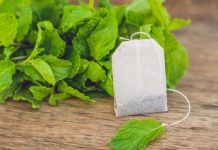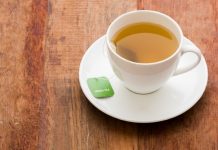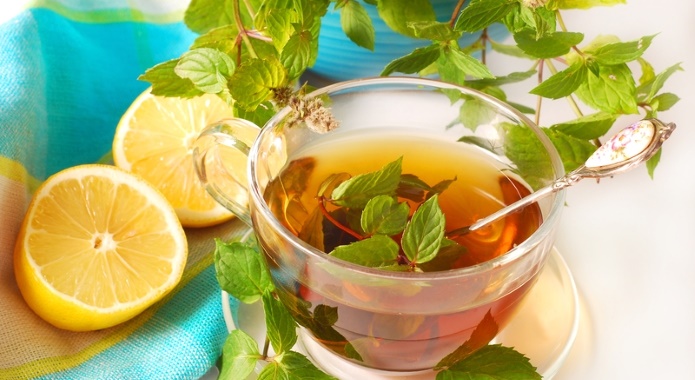
Do you drink enough tea during the day? Researchers recommend that you should have around 2 to 3 cups per day. One of the best choices is also one of the most comforting, especially during the winter months – the peppermint tea.
How many cups of peppermint tea should you drink a day?
I wouldn’t drink more than 2-3 cups of peppermint tea a day. Although this tea has awesome benefits, there are some side effects you should be aware of. It is a good idea not to drink more than 2-3 cups a day.
When you overdose on peppermint, it could cause diarrhea, heart palpitations, and a slowed heartbeat as well.
Although recommendation by University of Maryland Medical Center says that you can drink up to 4-5 cups of peppermint tea a day, I will stick with 2-3 cups just to be safe.
When to drink peppermint tea?
The best time to drink peppermint tea is in the evening. It will make you relax and has no caffeine in it, therefore, you will fall asleep faster and feel more refreshed. Known for its delicious taste and pleasant aroma, it is also excellent for your body and your mind.
Is peppermint tea good for you? Let’s take a look at thirteen must-know facts and benefits of drinking fresh mint tea.
PROVIDES RELIEF FROM COLD & FLU SYMPTOMS
(BENEFIT #1)

Congestion, runny nose, and fever are all typical symptoms of cold or flu (stomach pain is discussed more below). Luckily, there is powerful peppermint plant you can use to make a tea that will counteract these symptoms.
The mint found within your cup of tea (Menthol) is considered a natural decongestant that actually breaks down the phlegm that leads to coughing and problems with breathing.
There is also rosmarinic acid found within its leaves that has been shown to help with asthma. This acid will open your airways naturally and make it easier for you to breathe. Because it is so potent it’s included in many creams meant to aid with respiratory health and nasal congestion.
If you’re coughing and your throat is sore, this hot beverage will also provide relief. Coating the throat, you’ll find swallowing to be much more comfortable.
So remember, when you catch the flu and you have problems to breathe freely, just drink a cup of peppermint tea or even chew on a fresh leaf from this plant to ease symptoms.
RELATED RESEARCH STUDY:
“Relaxation of bronchial smooth muscles, increase in the ventilation and brain oxygen concentration, and decrease in the blood lactate level are the most plausible explanations.”
– Meamarbashi, A., and Rajabi, A. The effects of peppermint on exercise performance. 2013. Journal of the International Society of Sports Nutrition. 10: p. 15.
PROVIDES RELIEF FROM STRESS
(BENEFIT #2)

Relieving cold and flu symptoms isn’t the only thing that’s peppermint tea good for. Just the smell of peppermint has been shown to reduce and relieve stress. Not only will you be less tense, but this also allows you to fall asleep faster and get a better night’s sleep.
The best part?
You can drink it even right before bedtime and not worry about waking tired. Also, don’t forget that mint tea has no caffeine in it, therefore, it’s ideal beverage to unwind and relax after a hard day at work.
The menthol, which is the main active component of peppermint tea, is known to be a potent muscle relaxant. As stress is usually manifested in muscle tension, mint tea is the ideal companion to help you fight it.
RELATED RESEARCH STUDY:
“The combination of peppermint oil, eucalyptus oil and ethanol increased cognitive performance and had a muscle-relaxing and mentally relaxing effect, but had little influence on pain sensitivity.”
– Moss, M., et al. Modulation of cognitive performance and mood by aromas of peppermint and ylang-ylang. 2008. The International Journal of Neuroscience. 118(1): p. 59-77.
CALMS YOUR STOMACH
(BENEFIT #3)

Did you know that stomach pain and gas can be easily eradicated thanks to essential oils in the peppermint leaves? The process is quite simple.
The mint (also known as menthol) is a natural soother that will relax your tummy. Not only that, sipping a cup of hot liquid will also provide a relief to the tension in your belly.
According to the experts from EverydayHealth.com, mint tea helps with IBS:
“A study from 2011 published in Pain showed why peppermint might help people with irritable bowel syndrome, or IBS. The compounds in peppermint actually activate an anti-pain channel in the colon. This channel, called TRPM8, may reduce the pain linked to eating some spicy foods like mustard or chili, according to researchers. Since then, multiple studies have confirmed peppermint oil to be a beneficial treatment for IBS.”
Peppermint tea significantly reduces bloating and gas problems that make for an uncomfortable feeling in your bowels. However, a cup of this tea will not help with severe medical issues regarding your stomach.
RELATED RESEARCH STUDY:
“Peppermint oil is a safe and effective short-term treatment for IBS [Irritable Bowel Syndrome]. Future studies should assess the long-term efficacy and safety of peppermint oil and its efficacy relative to other IBS treatments including antidepressants and antispasmodic drugs.”
– Khanna, R., et al. Peppermint oil for the treatment of irritable bowel syndrome: a systematic review and meta-analysis. 2014. Journal of Clinical Gastroenterology. 48(6): p. 505-12.
GOOD SOURCE OF ANTIOXIDANTS
(BENEFIT #4)
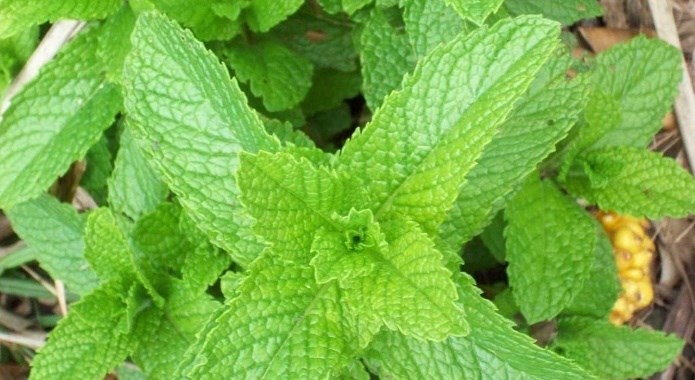
Peppermint, in general, is a strong antioxidant that allows you to fight off free radicals and keep your body healthy. The best part? I have never heard of a situation when someone had too many antioxidants.
Among the most potent are:
– Phenolic acids (e.g. rosmarinic and caffeic acids)
– Flavones (e.g. luteolin derivatives)
– Flavanones (e.g. eriocitrin derivatives)
The reduced amount of free radicals will relieve your immune system that can focus more on other issues within your body. Moreover, there are many health benefits of antioxidants including:
- Healthier, more youthful, glowing skin
- Longer life span
- Slower signs of aging, including of the skin, eyes, tissue, joints, heart, and brain
- Antioxidants may boost brain function
- Antioxidants like vitamin C can help with hair growth
Luckily, the peppermint plant is full of them when compared to other herbs and spices. Just don’t forget to include plant-based foods, fruits, and vegetables in your diet.
RELATED RESEARCH STUDY:
“The EtOAc, ACN and H2O-soluble extracts demonstrated the most potent iron(III) reductive and 1,1′-diphenyl-2-picrylhydrayl, 2,2′-azinobis(3-ethylbenzothiazoline-6-sulfonate) and hydroxyl free radical scavenging properties; however, the H2O and CH2Cl2-soluble extracts were the most potent extracts in the beta-carotene-linoleic acid bleaching inhibition assay. In terms of iron(II) chelation–an important antioxidant property–the PE, MeOH and H2O extracts demonstrated moderate iron(II) chelating activity.”
– Riachi, L.G., and De Maria, C.A. Peppermint antioxidants revisited. 2015. Food Chemistry. 176: p. 72-81.
PROMOTES DIGESTION
(BENEFIT #5)

This is the perfect tea for you if you suffer from indigestion or even irritable bowel syndrome. Mint is known to sooth the stomach and has been used outside of traditional medicine for thousands of years to aid in indigestion.
What happens is that peppermint actually improves the flow of bile that is used to digest fats. This ensures that digestion occurs faster and leaves less of an acidic environment within your stomach.
However, there are certain people who should stay away from mint according to LiveStrong.com:
“People with acid reflux disease should not drink peppermint tea, because it may have a numbing effect on the sphincter between the esophagus and stomach, allowing the acid to rise. … [M]oreover, it shouldn’t be used by people taking cyclosporine, antacids, acid reducers, diabetes drugs, blood pressure drugs or medications that are changed by the liver.”
Don’t forget that mint also relaxes muscles in your gut, allowing gas to pass more smoothly thus relieving bloating and discomfort.
RELATED RESEARCH STUDY:
“Peppermint oil is a safe and effective short-term treatment for IBS [irritable bowel syndrome]. Future studies should assess the long-term efficacy and safety of peppermint oil and its efficacy relative to other IBS treatments including antidepressants and antispasmodic drugs.”
– Khanna, R., et al. Peppermint oil for the treatment of irritable bowel syndrome: a systematic review and meta-analysis. 2014. Journal of Clinical Gastroenterology. 48(6): p. 505-12.
SUPPORTS YOUR LIVER & GALLBLADDER
(BENEFIT #6)
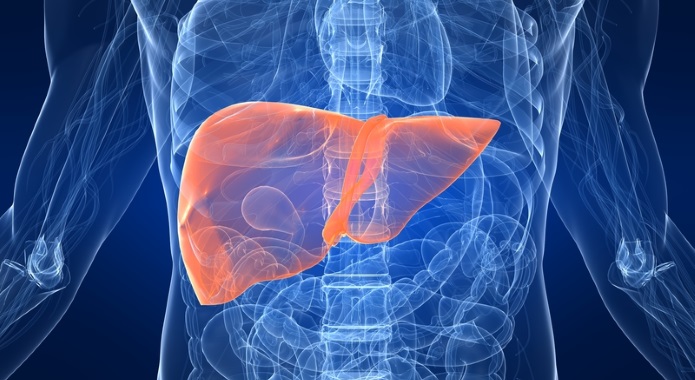
Did you know that fresh mint can cleanse your liver of toxins and actually help your body to dissolve small gallbladder stones? Ingredients found in peppermint plant are responsible for increasing the flow of bile.
If bile isn’t flowing properly, there is a higher chance that gallbladder stones would be formed and this can lead to a whole host of other problems. Bile is also really essential for you to absorb fat-soluble vitamins such as A, D, E and K.
Just have a look at what Colorado State University has to say about bile and your health if you don’t trust me.
“Bile is a complex fluid containing water, electrolytes and a battery of organic molecules including bile acids, cholesterol, phospholipids and bilirubin that flows through the biliary tract into the small intestine.”
“There are two fundamentally important functions of bile in all species. Bile contains bile acids, which are critical for digestion and absorption of fats and fat-soluble vitamins in the small intestine. Many waste products, including bilirubin, are eliminated from the body by secretion into bile and elimination in feces.”
As you can see, maintaining your gallbladder in a good condition and promoting your bile flow can be essential for your health.
RELATED RESEARCH STUDY:
“PO [peppermint oil] stimulates bile fluid secretion and thus has a choleretic effect. PO might play a role in upregulating CYP7A1 [cholesterol 7α-hydroxylase] and FXR mRNA [farnesoid X receptor messenger ribonucleic acid] levels, suggesting that the molecular mechanisms are related to gene expression involved in bile acid synthesis.”
– Zonq, L., et al. (2011). “Preliminary experimental research on the mechanism of liver bile secretion stimulated by peppermint oil“, in Journal of Digestive Diseases, Vol. 12(4): p. 295-301.
HELPS WITH CONSTIPATION
(BENEFIT #7)

One of the things you might not know about peppermint tea is that it may help you deal with and prevent constipation. As we mentioned earlier in the article, it helps with IBS, supports your liver and gallbladder, as well as calms your stomach.
These are all things that help fix your bowel movement.
Moreover, drinking enough water in the form of unsweetened tea is known to be very helpful in preventing constipation. Dehydration is one of the most common culprits of slow bowel movements among with low fiber diets, increased consumption of dairy products and a sedentary lifestyle.
There are many things you can do to prevent constipation besides drinking mint tea:
- Consume lots of high fiber foods (fruits, vegetables, beans and whole grains)
- Drink lots of water and unsweetened tea
- Light exercise (swimming, jogging, aerobics, walking)
Although I wasn’t able to find supporting research studies that would deal with the effects of mint on constipation specifically, you can’t go wrong if you drink a cup of tea just before bed.
HELPS WITH BAD BREATH
(BENEFIT #8)
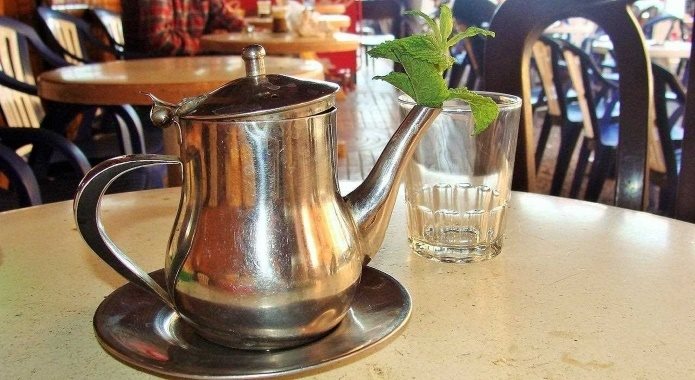
Each and every one of us knows that food you eat can get stuck between teeth and actually begin to rot. This will produce an unpleasantly smelling breath. Luckily, brushing your teeth may help with this problem.
However, there is also the problem of bacteria.
Whether you realize it or not, there are a lot of other things living in your mouth that leads to bad breath. A strong scent of peppermint masks the smell of bad breath while its antibacterial elements kill various germs and bacteria.
Fresh and clean breath should await you after drinking this hot beverage regularly. If you still fight with bad breath, there are other things you can try according to Cosmopolitan:
- Eat a low-carb diet balanced with fats and proteins
- Don’t forget your veggies
- Drink 48 ounces of water a day
- Chew on fresh mint leaves or parsley
- Brush and floss every single day
- Rinse with alcohol-free mouthwash that contains a zinc compound
- Chew sugarless gum that contains xylitol
As you can see from the list above, there are many ways you can fight against bad breath, not only by drinking peppermint tea.
RELATED RESEARCH STUDY:
“A (13)C-acetic acid breath test was continuously performed with the BreathID system, which monitors gastric emptying, for 4 h after the administration of the test meal. Using Oridion Research Software (beta version), the time for emptying of 50% of the labeled meals (T 1/2), the analog to the scintigraphy lag time for 10% emptying of the labeled meal (T lag), the gastric emptying coefficient (GEC), and the regression-estimated constants (beta and kappa) were calculated. After peppermint oil intake, the T lag and beta constant were significantly decreased. No significant differences in T 1/2, GEC, or kappa were observed between the two occasions.”
– Inamori, M., et al. (2007). “Early effects of peppermint oil on gastric emptying: a crossover study using a continuous real-time 13C breath test (BreathID system)“, in Journal of Gastroenterology, Vol. 42(7): p. 539-42.
PROVIDES RELIEF FROM MENSTRUAL CRAMPS
(BENEFIT #9)

Each and every woman knows that both bloating and muscle cramps are horrible menstrual symptoms. No woman wants to suffer from these side effects. And guess what? No one should.
Luckily, there is an easy solution at hand.
Menstrual cramps are usually caused by contractions of uterus muscle. Thanks to antispasmodic properties of menthol, peppermint tea helps to relax this muscle and to ease the pain.
With its ability to soothe your body and your head, cramp pain often subsides within 20–30 minutes of taking a cup of this tea. What is more, there have been numerous studies that showed women were more comfortable after drinking tea and had less bloating and pains as a result.
RELATED RESEARCH STUDY:
“While the bleeding amount did not significantly change, pain and its severity and all the clinical signs and symptoms decreased after taking peppermint extract. Because the side effect of herbal drugs is lower than other medicinal drugs, using mint is advised for treating dysmenorrhea symptoms.”
– Masoumi, S.Z., et al. Evaluation of mint efficacy regarding dysmenorrhea in comparison with mefenamic acid: A double blinded randomized crossover study. 2016. Iranian Journal of Nursing & Midwifery Research. 21(4): p. 363–367.
REDUCES MIGRAINE & HEADACHE
(BENEFIT #10)

Migraines and headaches are not for me. However, when my head is pounding, I often reach for a cup of tea instead of aspirin. Tea, especially when sipped, has been shown to relax tense muscles and ease the pain felt with a headache.
Aroma plays a big part in this too.
Did you know that congestion is one of the most common causes of head pain? When you smell mint, your nasal passages will open and clear away congestion. By opening up your airways, you’ll be allowing more oxygen to reach your bloodstream.
This will result in quick relief from even the worst migraine. Other teas you can use to successfully combat headaches include ginger tea, chamomile tea, and feverfew tea.
RELATED RESEARCH STUDY:
“A significant analgesic effect with a reduction in sensitivity to headache was produced by a combination of peppermint oil and ethanol. The essential plant oil preparations often used in empiric medicine can thus be shown by laboratory tests to exert significant effects on mechanisms associated with the pathophysiology of headache.”
– Göbel, H., et al. (1994). “Effect of peppermint and eucalyptus oil preparations on neurophysiological and experimental algesimetric headache parameters“, in Cephalagia, Vol. 14(3): p. 228-34; discussion 182
FIGHTS BACTERIA, FUNGI & VIRUSES
(BENEFIT #11)
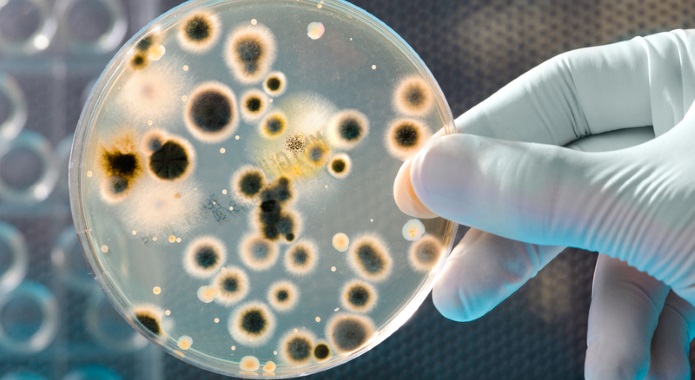
Study after study has been done on different types of teas and how they can help fight off various bacteria, viruses, and fungi. Surprisingly, peppermint tea seems to be more potent than a majority of others.
Thanks to its antibacterial properties it is efficient in destroying a lot of bacteria in your mouth. This keeps your mouth sparkling fresh.
According to the experts from LiveStrong, peppermint has the ability to fight off various bacterial pathogens:
“In an in vitro study published in 2001 in “Microbios,” researchers found that peppermint essential oils inhibited the growth of many common bacterial pathogens, including E. coli, H. pylori, S. aureus, salmonella and methicillin-resistant Staphylococcus aureus, or MRSA. They concluded that [substances in] peppermint oil showed potential as an antibacterial agent.”
Studies that have been done in test tubes have shown that this tea may even be able to beat the Herpes simplex virus. You’ll also want to take into account the antioxidant levels found within it. These substances will reduce free radicals to keep your body in the tip-top shape at all times.
It’s a mixture of beneficial properties of peppermint plant that will allow you to fight off ailments and boost your immune system. This is what makes this hot beverage a must-drink.
RELATED RESEARCH STUDY:
“In vitro, peppermint has significant antimicrobial and antiviral activities, strong antioxidant and antitumor actions, and some antiallergenic potential. Animal model studies demonstrate a relaxation effect on gastrointestinal (GI) tissue, analgesic and anesthetic effects in the central and peripheral nervous system, immunomodulating actions and chemopreventive potential.”
– McKay, D. L., et al. (2006). “A review of the bioactivity and potential health benefits of peppermint tea (Mentha piperita L.)“, in Phytotherapy Research, Vol. 20(8): p. 619-633.
HELPS WITH WEIGHT LOSS
(BENEFIT #12)

Did you know that mint tea might help you lose a little weight as well? Actually, there are three great ways how peppermint helps you to get the figure of your dreams.
A CUP OF TEA FOR REDUCED CALORIC INTAKE
Drinking peppermint tea before your meals will make you feel satiated even by eating smaller portions. This way, you will consume fewer calories during your day. Just make sure your cup of tea is unsweetened. For best benefit choose fresh mint leaves for your tea.
MINT FOR BETTER APPETITE CONTROL & REDUCED CRAVINGS
When you feel intense food cravings, you usually end up eating sweets loaded with refined carbs, trans fats, and other unhealthy junk. Although all this is delicious, it usually is jampacked with lots of calories.
Luckily, mint helps control appetite according to the experts from LiveStrong:
“Certain scents, including peppermint oil, can help control appetite and cravings. A 2008 study conducted by the Wheeling Jesuit University evaluated the level of hunger of participants after inhaling peppermint oil every 2 hours for five days. Participants who inhaled the peppermint oil experienced less hunger and fewer cravings than those who didn’t use the oil.”
As the main part of weight loss is calories in – calories out, drinking peppermint tea (or even better option is smelling peppermint oil) will help you stay in caloric deficit needed to shed pounds.
MINT FOR STRESS REDUCTION
The last thing to point out is that mint helps you calm down and relax. It is a known fact that when we feel stressed, we usually tend to eat comfort foods. This is often some nasty junk food like ice cream, cookies, and high carb and fat loaded pastry.
Again, there is a simple equation – less stress means fewer calories ingested. Simple as that.
RELATED RESEARCH STUDY:
“Results indicate participants consumed significantly fewer total calories, calories from saturated fat, total fat, and sugar during the peppermint inhalation condition. Participants also rated their hunger level significantly lower during peppermint inhalation. The primary implication of these results is that peppermint scent can be used as an effective adjunct to decrease appetite, decrease hunger cravings, and consume fewer calories, which may lead to weight reduction and greater overall health.”
– Reed, A., et al. (2008). “Effects of peppermint scent on appetite control and caloric intake“, in Appetite, Vol. 51(2): p. 393.
IMPROVES MENTAL FOCUS & CONCENTRATION
(BENEFIT #13)

One of the many benefits of peppermint is that it helps with concentration and improves memory. According to studies done it seems that brain reacts to mint leaf aroma and it helps increase alertness.
The scent of peppermint tea is said to promote mental performance and focus, making this tea great for students or those that need peak mental state.
Even the famous Washington Post noted that mint might help with memory:
“In the 1990s, researchers at University of Cincinnati found that a whiff of peppermint or muguet, a scent similar to lily of the valley, helped test subjects concentrate and do better on tasks that required sustained concentration. Joel Warm, a professor of psychology who conducted the research with his late colleague William Dember, said there is more than a bit of truth in the peppermint theory.”
What is more, Dr. Bryan Raudenbush from Wheeling Jesuit University used pencils with peppermint scent on students and he noted that:
“Peppermint has been shown to increase activity in the reticular activating system in our brain, which is the part that wakes us up in the morning. Additional activity in this area also has been tied with increased mental performance. The scent from the pencil is most likely keeping the students more alert and focused, so that they can study more efficiently…”
I bet you don’t know that peppermint scent might help increase focus and alertness while driving as well. According to another study done on Wheeling Jesuit University, peppermint tea is associated with decreased anxiety as well as decreased fatigue while driving.
RELATED RESEARCH STUDY:
“Peppermint was found to enhance memory whereas ylang-ylang impaired it, and lengthened processing speed. In terms of subjective mood peppermint increased alertness and ylang-ylang decreased it, but significantly increased calmness. These results provide support for the contention that the aromas of essential oils can produce significant and idiosyncratic effects on both subjective and objective assessments of aspects of human behavior.”
– Moss, M., et al. (2008). “Modulation of cognitive performance and mood by aromas of peppermint and ylang-ylang“, in The International Journal of Neuroscience, Vol. 118(1). Pp. 59-77
READ MORE: 10 BEST PEPPERMINT TEA BRANDS
CONTRAINDICATIONS, WARNINGS & SIDE EFFECTS YOU NEED TO KNOW ABOUT

Are you worried about overdosing on peppermint? Luckily, studies have not found peppermint to provide any real dangers to a person. There are some issues that might be caused by drinking too much of this tea, click here for more details. The only exception is when you take incredibly large amounts!
Digging through research, most studies say that this hot beverage may cause problems when consumed in high dosages, but none really says what would occur.
However, a few precautions are seen with:
- Infants & small children – Do not give peppermint tea to infants or small children. The aromatic oil from peppermint can cause serious breathing problems.
- Pregnancy – While this tea itself is safe, there may be a potential risk to the fetus when drank in massive quantities. Typical consumption is deemed okay in this case, but extra large amounts have not been studied.
- Allergy – The most common danger may be an allergic reaction. If you know you have an allergy to this plant, do not consume it! This is valid for beverages made from this plant as well.
- Acid reflux – People with acid reflux should not drink peppermint tea, because it may have a numbing effect on the sphincter between the esophagus and stomach, allowing the acid to rise.
As always, you’ll want to consume a reasonable amount (2-3 cups a day) to be safe. However, I believe that you would have a difficult time experiencing any negatives from this drink itself.
So, the only question is “why aren’t you drinking more peppermint tea?”




